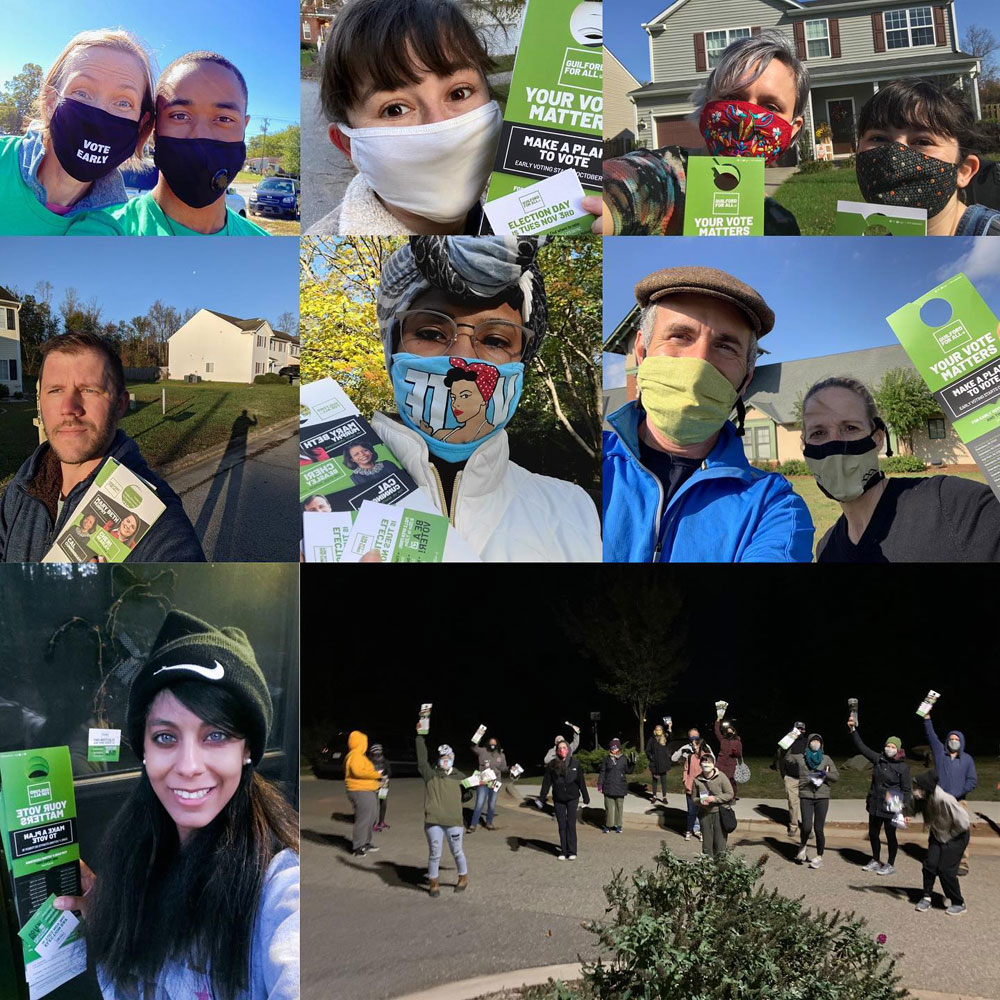
Before Election Day, Republicans had controlled the county commission of Guilford County, North Carolina, (county seat Greensboro) for eight years. But this year, the balance of power shifted dramatically from 5–4 Republican to 7–2 Democrat. In other words, three of nine seats changed hands, a veritable local political earthquake.
In the aftermath of the 2020 presidential elections, Georgia and Arizona have gotten outsized attention, as these were the only two typically Republican states that President-Elect Joe Biden carried. In North Carolina, Biden came close, but Donald Trump prevailed by a 74,000-vote margin out of 5.54 million votes cast. For some Democrats, there is considerable handwringing about why that occurred.
Yet statewide results can obscure important local developments. Why did Guilford County shift when the state did not? It seemed worthwhile to find out. So NPQ interviewed organizers from the Carolina Federation, a 501c4 that in 2018 began to develop Guilford for All and three other county chapters.
One thing that Guilford County teaches us is a lesson regularly emphasized by the late Tip O’Neill, Speaker of the House from 1977 through 1986, who famously noted that “all politics is local.” The phrase is frequently misread as a claim that local issues always supersede national ones. But O’Neill’s point was really that politics, rightly understood, builds on relationships, on knowing and meeting the needs of local constituents.
These days, that idea is central to the concept of “base building.” And by taking a look at Guilford County, we can better understand what base building is, how it works, what are challenges in the work, and why base-building requires a long-term investment of time and resources—not short-term mobilization.
A Bet on Leadership Development
The approach employed by the Carolina Federation is a base-building model. Sendolo Diaminah, co-director of the federation, notes that “We have the orientation to building grassroots power of the ongoing base building work, the competency of everyday folks in our community.” This means developing leaders for the long haul, rather than a sole focus on election mobilization.
For the Carolina Federation, planning began in 2018, with a formal launch in early 2019. Diaminah adds that the organization “built through that year, and that was essential for what was possible in 2020. We built a large field program because we built those deep roots.” As a result, Diaminah notes, many of the field organizers hired for the campaign were “hired out of our membership, rather than fly-by night or parachute operations.”
There are other consequences of this “go deep” approach. One is geography. The Carolina Federation may be statewide in name, but North Carolina has 100 counties. The Carolina Federation chose to focus on four of them—New Hanover (county seat Wilmington), Guilford, Forsyth (county seat Winston-Salem), and Durham.
Even with its four-county focus however, Diaminah points out that the organization had “the largest volunteer-driven field organization for the state,” involving an estimated 2,000 volunteers who performed 5,000 shifts and had conversations with about 85,000 people, well above their original goal of 30,000 conversations.
Theo Luebke, who codirects the federation with Diaminah, describes the process required to build the volunteer team. “We started training and pulling together a group of people in early 2019 in dozens and dozens of one-on-one conversations. It was a six-month intensive process of talking to people, and asking them, ‘What is your vision? Is this the type of thing you’re willing to step into to make possible?’ Out of that we had a series of intensive trainings in the fall of 2019.”
Volunteer steering committees were formed in the four focus counties afterward. As a result, when COVID arrived in early 2020, there was already “a crew of folks who are connected and done relational work and are resourced to respond.”
COVID, Luebke notes, made it very difficult to do initial conversations. The Carolina Federation has paused on forming new chapters until the pandemic passes, but they were able to use Zoom to maintain connections with those already mobilized. Individual organizers could opt to make contacts in person or by phone, with those going in-person provided with personal protective equipment. All told, Luebke estimates that 10–15,000 of those 85,000 conversations occurred through people who knocked on doors, the old-fashioned community organizing way.
Ashley Daniels is an organizer for the Carolina Federation based in Wilmington. The county she lives and works in, New Hanover, went for Biden in 2020, the first time a Democratic presidential candidate had carried that county since 1976. But when asked to name wins, she begins by talking about building relations of trust with local organizations in the region like the local NAACP chapter, the 15,000 conversations that organizers were able to have with residents, and the fact that they were able to employ five local women—three who were Black, one Afro-Latina, and one gay. Only then does she add, “Of course, we turned the county blue for Joe Biden for the first time in 44 years.” This, Daniels notes, says that “people are fed up with Trump,” but it is also “testament to the work.”
Shifting Guilford County
The Carolina Federation may operate statewide, but many decisions are made by those local volunteer committees. In Guilford, the committee was called Guilford for All. Luebke explains that one task that each chapter took responsibility for was the endorsement process. This served an important political education function. Each chapter had to decide where to prioritize. Some candidates, Luebke observes, are movement endorsements—that is, candidates highly aligned with the group’s vision. Others however are strategic endorsements, more about ousting the opponent than who you are supporting. These decisions, notes Luebke, involve core issues of democracy and deliberation, of how to build power and how to use it.
In Guilford County, in the summer of 2020, Guilford for All decided that “in order for things to change, we had to take control of the Guilford County Commission.” Gerrymandering of districts had ensured right wing control since 2010. “The consequences,” Luebke explains, “were really significant and felt. Schools, school construction, housing—everything was being sacrificed on the altar of tax cuts for the wealthy.”
After much debate, the group decided to go “all in” on a public schoolteacher.
“By the numbers,” Luebke recalls, “she was unlikely to win, but they said, ‘This is important and transformative, and this candidate really aligns with us.’” When it was all over, Mary Beth Murphy had won her race by 72 votes out of over 43,000 cast. This, notes Luebke, was the result of “thousands and thousands of conversations with folks in that district…the future of the county is going to look so different with the folks they elected.”
Diaminah adds:
What we are looking at is a real potential fiscal crisis of public services. Who we have in leadership over the next period is going to be really, really key about how that gets faced. And the previous county commission, we have no doubt that their orientation would be “Let’s just slash. Let’s just cut.” And no conversation about how do we actually use the power of public sector to take on the task of resourcing our people? So that means actually asking questions, like, how do we raise revenue to actually pay for the services that are so essential in this moment?
Jess St. Louis, who is a member of the Guilford for All steering committee and participated actively in the canvassing, notes that one thing the victory means for her is “a chance to repair our schools.… Right now, many of the schools have no working heat or cooling.”
St. Louis adds that another key issue is housing evictions. “Earlier in the pandemic we ran a campaign to keep people in their homes,” she relates. “That was just off the table given the former commission majority. They were intransigent.” Now, she notes, as the eviction moratoria begin to run out, “We have a county commission that can work for us.”
Nine Core Principles
Election-based organizing is often highly transactional. Maintaining a transformative vision is not easy. The Carolina Federation, to preserve its vision, is guided by nine “DNA” principles that “infuse everything that we do.”
Sign up for our free newsletters
Subscribe to NPQ's newsletters to have our top stories delivered directly to your inbox.
By signing up, you agree to our privacy policy and terms of use, and to receive messages from NPQ and our partners.
To summarize, these principles include three core beliefs that the roots of many social problems in excessive corporate power, that solutions come from political and economic democracy, and that solidarity builds collective well-being. Three core principles in tactics are to focus on long-term grassroots power, recruit and develop leaders, and seek structural changes. Three core principles in leadership practice are to choose responsibility, to ask for commitments, and to build trust and reduce harm.
Politics, notes Diaminah, is “about ideas and policies and positions,” but in the federation’s trainings, it seeks to engage the whole person, in part by using somatic (body-based) training strategies. As Diaminah explains, “Our bodies aren’t just vehicles that take us to meetings. Our hopes, our fears, our dreams live in our bodies. And if we want to actually build a new and a bigger ‘we,’ that means being present to the emotions. That means being present to both the felt pleasures and pains of doing this work. What that means for us is we don’t just have technique-based trainings.”
Diaminah points out that asking for commitments is one of the nine principles. But how do you get commitments? The idea is not just to get a person to say they will vote for Person A. As Diaminah explains, “First, get in touch with what is at stake for you…. Can you feel it? Think about that person who you want to have healthcare. Feel that. From that place, share with your partner why this [is important] to you, and ask them if they will join you in being a part of something that makes a difference. Ask them what they really care about. And don’t stop asking until you can feel what they are feeling.”
Diaminah adds that it is important for the person who asks for the commitment to pay attention to how they respond emotionally to the response they get, whether positive or negative. “There are whole histories inside of that. So many of our people don’t make asks, because we have long stories rooted in oppression. ‘Who are you to ask?’”
A key goal of this training technique, he notes, is to help people break out of systems of oppression. “If we reduce it to skill-based thing and remove the body and the understanding that both power and oppression live in our bodies, it just gets flat.”
Organizing in the South
There are many myths about organizing in the South. Historically, as NPQ has noted, philanthropy has greatly underinvested in the South. According to the National Committee for Responsive Philanthropy, for example, in the first half of the last decade, philanthropic spending per capita in New York City was nearly six times as high as in Georgia, and Georgia got more support than many other areas of the South. As one Atlanta foundation official noted with evident scorn, the South has often been criticized for an alleged “absence” of capacity and leadership, even “when actually we know it is the birthplace of the Civil Rights Movement.”
Daniels observes, “I think for one thing, like we do with everything, we like to think of the South as a monolith…an election result does not tell the full story of the South.”
The South has long had progressive voices, Daniels notes, but these have often been repressed. What’s new in Georgia is not the presence of progressive voices, but the fact that those voices are now being respected and heard. She adds, “The more that we have organizations, the more that we have movements that are directly [engaged] in liberating people, we will see more and more of that in the South.”
Luebke elaborates that, “In many ways, we root the work we do in the traditions and the struggles of those in the South who come before us. Most obviously that is the Black freedom movement of the mid-twentieth century, but also the populist movements of the 19th century, the abolitionist movements, essentially the struggle to get free that has been in this region for hundreds of years. Folks are used to doing that work, as we would say, ‘making a lot out of not a lot of nothing.’”
He adds, “We are more relational, we are more interconnected in the work that we do, because we don’t have the ability to live in our separate silos. There is not enough to go around. You have to work with people. If you look at places like Georgia and North Carolina, and Virginia, you’ve seen where folks are putting in the work for years and years and decades and then that work is recognized and resourced, you actually see what is possible. There is so much potential in this sort of work, but it is long-term. It is relational. It doesn’t happen overnight.”
Repairing the Harm
Daniels emphasizes the critical importance to her of the ninth of the group’s nine “DNA Principles,” which involves repairing harm.
You can’t just talk at people and tell them not to be racist…you have to repair the harm that’s been done to people. You are going to have to do it together. And everyone…who is invested in the transformation is going to have to buy into the healing and the repairing of the harm.
Diaminah points out that repairing harm requires addressing core failures—not just of Trump, but of liberals, a challenge that is national in scope. Diaminah observes, “There are abandoned people…who have been deeply harmed, who the stories we tell about who is on the side of the progress and who is trying to take us backwards completely disappears the tremendous violence against those people.”
“We can’t transform the politics without coming clean and getting right with the fact that the vast majority of our people have been decimated and devastated,” Diaminah says. “And then we have a liberal establishment that says this country is pretty good and let’s just keep moving forward, like no recognition of what people have gone through.”
This shows up in the organizing work, with organizers frequently encountering people who ask, “Why should I participate?” Diaminah explains, “Our persuasion isn’t just to people who have been seduced by the right, it is also to people who have been seduced by nihilism and despair for very good reasons given the options that have been put in front of them.”
How does organizing break through this despair? One way is to recruit movement-backed candidates. As Diaminah observes, in Guilford, “we had somebody who was actually speaking to both the pain and the aspirations of a different set of people that usually get talked about in usual progressive politics. We talk about that as bringing a multiracial populist message to our folks that can create a weave that is really different than the us and them that currently exists. The us and them that currently exists is incredibly elitist and racialized. And we think that can be really, really different.”
But, Diaminah concedes, “it is hard to identity, recruit, and develop candidates who are going to bring that different message and that different politics. When we do it, we are able to move our people in a very different way. But a lot of this year was getting behind defensive candidates, strategic candidates against the right. And that made us weaker than we would have been had we been able to develop and identify more movement candidates who can excite our people and bring together a coalition that so many people say can’t be brought together.”
A Nonprofit “Passing Gear”?
Famously, the late Ford Foundation program officer Paul Ylvisaker used to describe philanthropy as society’s passing gear. Luebke makes a similar observation about how the Carolina Federation, a 501c4 organization, plays an accelerator role in partnership with 501c3 nonprofits, who of course are barred by their tax status from endorsing specific candidates.
As Luebke details, “When you have a c4…in the mix, in many ways we can provide some muscle to our c3 issue allies, our folks who are doing advocacy, where maybe they are the ones with the expert knowledge, they have been working on housing in the community for years. But they are not the ones who can move 2,000 votes in the next election based on who they endorse. We’ve seen this certainly in Durham over the last couple of years, in which we believe having c4 independent political organizations with demonstrated political power at the ballot box have actually been able to…help our c3s advance the policy goals that they have, because there is a little bit of muscle behind it now. That’s just the reality of politicians and how politicians work.”
Daniels notes that the group also provides a critical public education function. “A lot of our people didn’t know what a county commissioner did, [and] a lot of our people had never been in a meeting with a state senator before.” The federation brings people into direct contact with public officials and fosters expectations of accountability.
Daniels adds, “A lot of our people, when they have been in the organization, they have learned how to facilitate meetings, they have learned how to phone bank, they’ve learned…about elected offices, and they see themselves in that role … Right now, we have a city council of all realtors. And people who once upon a time didn’t know what a city councilman or county commissioner did, now say ‘I can sit in that seat. And I am going to.’”










